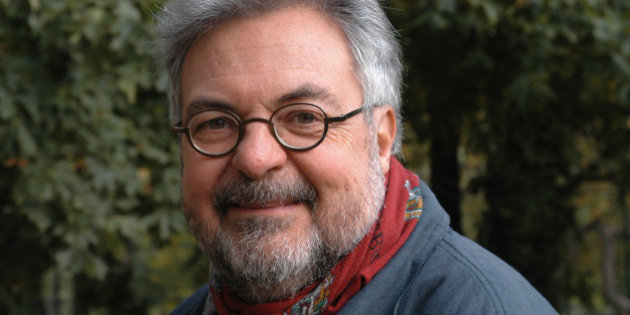 Michel Tremblay is a giant in Canadian literature, but anglophone readers are generally only familiar with his plays. Les Belles-Soeurs (“The Sisters-in-Law”) transformed french-language theatre in Canada. He was definitely a vanguard, writing vividly in a colloquial Canadian, and exploring new subject matter. Over the years, Tremblay built up a huge corpus of work, including many novels and television dramas in addition to the plays, a “comédie humaine” from the sinews of Montreal. Tremblay is an oddity, an openly gay author who is best known for his understanding of women. Satisfyingly complex roles for female actors are hard to find on the stage, and Tremblay has earned their gratitude and respect.
Michel Tremblay is a giant in Canadian literature, but anglophone readers are generally only familiar with his plays. Les Belles-Soeurs (“The Sisters-in-Law”) transformed french-language theatre in Canada. He was definitely a vanguard, writing vividly in a colloquial Canadian, and exploring new subject matter. Over the years, Tremblay built up a huge corpus of work, including many novels and television dramas in addition to the plays, a “comédie humaine” from the sinews of Montreal. Tremblay is an oddity, an openly gay author who is best known for his understanding of women. Satisfyingly complex roles for female actors are hard to find on the stage, and Tremblay has earned their gratitude and respect.
This is the first of his novels that I’ve read. The main character is a singer whose career stalled after a single album. The book focuses on the period in the early 1960s when Montreal’s music scene was especially vital. Félix Leclerc, Gilles Vigneault, Monique Leyrac, Clémence Desrochers, Claude Léveillée and others were creating fabulous songs, many of them with extraordinarily beautiful lyrics*. Tremblay interweaves history and fiction delicately. The prose style is very, very Canadian, anchored in real speech and real thought, without any affectations. The people are completely believable. The story is structured as an album: ten songs, ten situations, ten meditations on what might have been. It explores something hardly touched on by writers, the soul searching of a life that is neither tragic nor triumphant, but caught, like most of us are, somewhere in between.
*Perhaps the most famous song from that period was Gilles Vigneault’s “Mon Pays”. This is somewhat of a digression, but the lyrics of that song might convey the intensity of feeling in the music of that time, and it is crucial to understand that to appreciate Tremblay’s novel.
Mon pays ce n’est pas un pays, c’est l’hiver
Mon jardin ce n’est pas un jardin, c’est la plaine
Mon chemin ce n’est pas un chemin, c’est la neige
Mon pays ce n’est pas un pays, c’est l’hiver
Dans la blanche cérémonie
Où la neige au vent se marie
Dans ce pays de poudrerie
Mon père a fait bâtir maison.
Et je m’en vais être fidèle
A sa manière, à son modèle
La chambre d’amis sera telle
Qu’on viendra des autres saisons
Pour se bâtir à côté d’elle.
Mon pays ce n’est pas un pays, c’est l’hiver
Mon refrain ce n’est pas un refrain, c’est rafale
Ma maison ce n’est pas ma maison, c’est froidure
Mon pays ce n’est pas un pays, c’est l’hiver.
De mon grand pays solitaire
Je crie avant que de me taire
A tous les hommes de la terre
Ma maison c’est votre maison.
Entre mes quatres murs de glace.
Je mets mon temps et mon espace
A préparer le feu, la place
Pour les humains de l’horizon
Et les humains sont de ma race.
Mon pays ce n’est pas un pays, c’est l’hiver
Mon jardin ce n’est pas un jardin, c’est la plaine
Mon chemin ce n’est pas un chemin, c’est la neige
Mon pays ce n’est pas un pays, c’est l’hiver
Mon pays ce n’est pas un pays, c’est l’envers
D’un pays qui n’était ni pays ni patrie
Ma chanson ce n’est pas une chanson, c’est ma vie
C’est pour toi que je veux posséder mes hivers
This is very hard to translate. The words blow like a snowstorm in French, and a literal translation can convey the ideas, but not the emotion:
My country is not a country, it’s winter.
My garden is no garden, it’s the plain.
My road is not a road, it’s the snow.
My country is not a country, it’s the winter.
In the white ceremony,
where the snow weds the wind
In this land of powder crystals
My father built his house.
And I will be faithful
To his manner, his example
My guest room should be filled
And others will come from different seasons
To build next to it.
My country is not a country, it’s the winter.
My refrain is not a chorus, it’s a blizzard.
My house is not a house, it’s the frost.
My country is not a country, it’s the winter.
From my vast lonely land
I’ll cry out just once before going quiet,
To all the men of this Earth:
“My house is yours.
Between these four walls of ice
I set aside this time and space
For all humanity, from all horizons
Because all humans are my race.
My country is not a country, it’s winter.
My garden is no garden, it’s the plain.
My road is not a road, it’s the snow.
My country is not a country, it’s the winter.
My country is not a land, no, the reverse
Of a land, neither country nor fatherland
My song is not a song, it’s my life.
It’s for you that I want to possess my winters.
0 Comments.